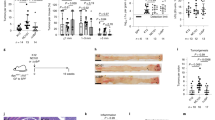Abstract
Inflammation and compromised immune responses often increase colorectal cancer (CRC) risk. The immune-modulating effects of limonin on carcinogen/inflammation-induced colorectal cancer (CRC) were studied in mice. Male Balb/c mice were randomly assorted into three groups (n = 6): healthy control, non-treated CRC-induced (azoxymethane/dextran-sulfate-sodium AOM/DSS) control, and CRC-induced + 50 mg limonin/kg body weight. The CRC developments were monitored via macroscopic, histopathological, ELISA, and mRNA expression analyses. Limonin downregulated inflammation (TNF-α, tumor necrosis factor-α), enhanced the adaptive immune responses (CD8, CD4, and CD19), and upregulated antioxidant defense (Nrf2, SOD2) mRNA expressions. Limonin reduced serum malondialdehyde (MDA, lipid peroxidation biomarker), prostaglandin E2, and histopathology inflammation scores, while increasing reduced glutathione (GSH) in CRC-induced mice. Limonin significantly (p < 0.05) increased T cells (CD4 and CD8) and B cells (CD19) in spleen tissues. The CD335 (natural killer cells) were increased in the CRC-induced mice and limonin treatment restored them to normal levels suggesting reinstatement to normal colon conditions. Limonin apparently mitigated CRC development, by ameliorating adaptive immune responses (CD8, CD4, and CD19), reducing inflammation (serum prostaglandin E2; TNF-α, innate immune responses) and oxidative stress, and enhancing the endogenous anti-oxidation defense reactions (GSH) in CRC-induced mice.



Similar content being viewed by others
Data availability
Provided as supplementary material.
References
Arnold M, Sierra MS, Laversanne M et al (2017) Global patterns and trends in colorectal cancer incidence and mortality. Gut 66:683–691. https://doi.org/10.1136/gutjnl-2015-310912
Axelrad JE, Lichtiger S, Yajnik V (2016) Inflammatory bowel disease and cancer: the role of inflammation, immunosuppression, and cancer treatment. World J Gastroenterol 22:4794. https://doi.org/10.3748/wjg.v22.i20.4794
Chidambara Murthy KN, Jayaprakasha GK, Kumar V et al (2011) Citrus limonin and its glucoside inhibit colon adenocarcinoma cell proliferation through apoptosis. J Agric Food Chem 59:2314–2323. https://doi.org/10.1021/jf104498p
Chikara S, Nagaprashantha LD, Singhal J et al (2018) Oxidative stress and dietary phytochemicals: role in cancer chemoprevention and treatment. Cancer Lett 413:122–134. https://doi.org/10.1016/j.canlet.2017.11.002
Deschoolmeester V, Baay M, Lardon F et al (2011) Immune cells in colorectal cancer: prognostic relevance and role of MSI. Cancer Microenviron 4:377–392
Dossa AY, Escobar O, Golden J et al (2016) Bile acids regulate intestinal cell proliferation by modulating EGFR and FXR signaling. Am J Physiol Gastrointest Liver Physiol 310:G81-92. https://doi.org/10.1152/ajpgi.00065.2015
Hartl D, Starosta V, Maier K et al (2005) Inhaled glutathione decreases PGE2 and increases lymphocytes in cystic fibrosis lungs. Free Radic Biol Med 39:463–472. https://doi.org/10.1016/j.freeradbiomed.2005.03.032
Kinnula VL, Crapo JD (2004) Superoxide dismutases in malignant cells and human tumors. Free Radic Biol Med 36:718–744. https://doi.org/10.1016/j.freeradbiomed.2003.12.010
Laroui H, Ingersoll SA, Liu HC, et al (2012) Dextran sodium sulfate (DSS) induces colitis in mice by forming nano-lipocomplexes with medium-chain-length fatty acids in the colon. PLoS One 7: https://doi.org/10.1371/journal.pone.0032084
Li Y, Shen L, Luo H (2016) Luteolin ameliorates dextran sulfate sodium-induced colitis in mice possibly through activation of the Nrf2 signaling pathway. Int Immunopharmacol 40:24–31. https://doi.org/10.1016/j.intimp.2016.08.020
Müller-Hermelink N, Braumüller H, Pichler B et al (2008) TNFR1 signaling and IFN-γ signaling determine whether T cells induce tumor dormancy or promote multistage carcinogenesis. Cancer Cell 13:507–518
Nakanishi M, Rosenberg DW (2013) Multifaceted roles of PGE2 in inflammation and cancer. Semin Immunopathol 35:123–137
Saadatdoust Z, Pandurangan AK, AnandaSadagopan SK et al (2015) Dietary cocoa inhibits colitis associated cancer: a crucial involvement of the IL-6/STAT3 pathway. J Nutr Biochem 26:1547–1558. https://doi.org/10.1016/j.jnutbio.2015.07.024
Sadeghi MR, Jeddi F, Soozangar N et al (2017) The role of Nrf2-Keap1 axis in colorectal cancer, progression, and chemoresistance. Tumor Biol 39:101042831770551. https://doi.org/10.1177/1010428317705510
Shimizu S, Miyamoto S, Fujii G et al (2015) Suppression of intestinal carcinogenesis in Apc-mutant mice by limonin. J Clin Biochem Nutr 57:39–43. https://doi.org/10.3164/jcbn.15-28
Sorenmo KU, Krick E, Coughlin CM, et al (2011) CD40-Activated B cell cancer vaccine improves second clinical remission and survival in privately owned dogs with non-Hodgkin’s lymphoma. PLoS One 6: https://doi.org/10.1371/journal.pone.0024167
Tanaka T, Kohno H, Tsukio Y, Honjo S, Tanino M, Miyake M, Wada K (2000) Citrus limonoids obacunone and limonin inhibit azoxymethane-induced colon carcinogenesis in rats. BioFactors 13:213–218. https://doi.org/10.1002/biof.5520130133
Tanaka T, Maeda M, Kohno H et al (2001) Inhibition of azoxymethane-induced colon carcinogenesis in male F344 rats by the citrus limonoids obacunone and limonin. Carcinogenesis 22:193–198. https://doi.org/10.1093/carcin/22.1.193
Yuen GJ, Demissie E, Pillai S (2016) B lymphocytes and cancer: a love–hate relationship. Trends in Cancer 2:747–757
Zhang L, Zhao Y, Dai Y et al (2018) Immune landscape of colorectal cancer tumor microenvironment from different primary tumor location. Front Immunol 9:1578. https://doi.org/10.3389/fimmu.2018.01578
Acknowledgements
We thank the Ministry of Higher Education for the partial scholarship (MyBrain15), Universiti Putra Malaysia for the seed research Putra Grant (GP-IPS/2018/9623000) and the staff from Comparative Medicine and Technology (COMeT), Institute of Bioscience, Universiti Putra Malaysia (UPM), for the help provided in handling the animals throughout the study.
Funding
This work was funded by the Ministry of Higher Education partial scholarship (MyBrain15), and Universiti Putra Malaysia postgraduate Putra Grant (GP-IPS/2018/9623000).
Author information
Authors and Affiliations
Contributions
NIMI executed the experiments, planning, data collection, and manuscript preparation, NMM is the veterinary clinician for animal studies, and SM is the grant recipient, main supervisor, project planning coordinator and manuscript writing/editing, principal researcher. IFM and NME assisted in planning the animal study. All the researchers approved the final manuscript. All the authors read and approved the manuscript and all data were generated in-house and that no paper mill was used.
Corresponding author
Ethics declarations
Ethical approval
All applicable international, national, and/or institutional guidelines for the care and use of animals were followed. The animal study protocol was approved by the Institutional Animal Care and Use Committee (IACUC), Universiti Putra Malaysia (UPM/IACUC/AUP-R069/2017).
Consent to participate
Not applicable.
Consent to publish
Not applicable.
Competing interests
The authors declare no competing interests.
Additional information
Publisher's note
Springer Nature remains neutral with regard to jurisdictional claims in published maps and institutional affiliations.
Supplementary Information
Below is the link to the electronic supplementary material.
Rights and permissions
About this article
Cite this article
Ishak, N.I.M., Mohamed, S., Madzuki, I.N. et al. Limonin modulated immune and inflammatory responses to suppress colorectal adenocarcinoma in mice model. Naunyn-Schmiedeberg's Arch Pharmacol 394, 1907–1915 (2021). https://doi.org/10.1007/s00210-021-02101-6
Received:
Accepted:
Published:
Issue Date:
DOI: https://doi.org/10.1007/s00210-021-02101-6




